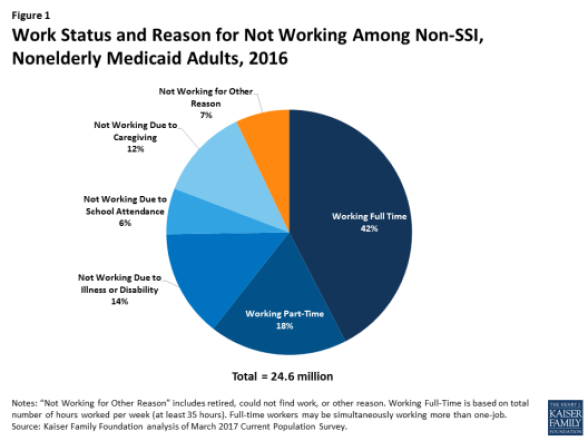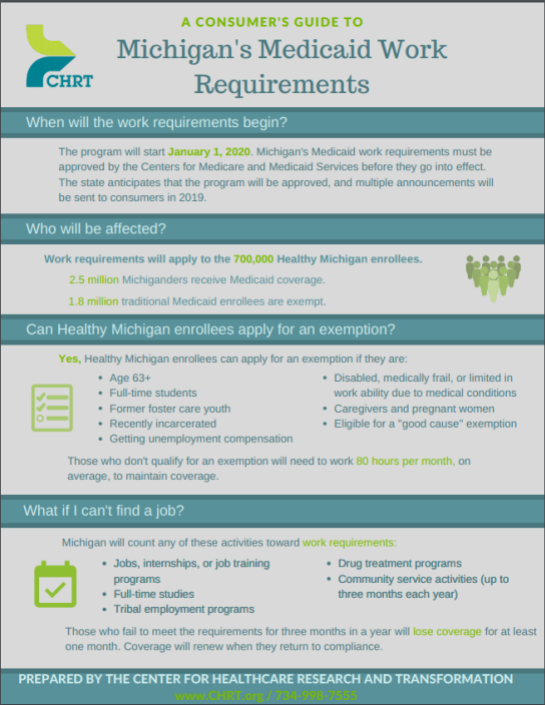Recently, a number of proposals have been put forth by various government bodies to tighten work requirements for those who receive government assistance. Michigan Coalition Against Homelessness (MCAH) takes a firm stand against work requirements, in that we believe it is a solution in search of a problem which could adversely affect the tens of thousands of individuals experiencing homelessness each year in Michigan.
The US Department of Housing and Urban Development under Secretary Ben Carson has shifted its criteria to reflect a perception of government assistance recipients as people who aren’t pulling their weight, or even taking advantage of the system. Buzzwords such as “self-sufficiency” and “personal responsibility” are often employed, with the stated goal by believers in this worldview to push targeted demographics to become independent and, well, self-sufficient.
Work requirements are a reflection of this perception. Work requirements are fairly self-explanatory on the surface but can take on a variety of different forms and be applied to all government benefits. At this time, we are seeing attacks against federal and state programs including SNAP, Medicaid, and housing assistance. The most common and straightforward form of work requirements is a simple minimum number of hours per week recipients of X government program are required to work, volunteer, attend school, or undergo workforce training.
On a base level, MCAH opposes work requirements because they are a solution in search of a problem. Earlier in 2018, Secretary Carson was directed by the Trump Administration to put forth proposed work requirements for federal housing recipients, which wouldn’t allow recipients to deduct costs for necessities such as health care and child care when reporting income. He justified this by claiming that many in government housing were able to include deductions that others might not be aware of, reinforcing the mindset of government assistance recipients as freeloaders living off the government and not working.
But the evidence does not support that claim and paints a very different reality. The majority of individuals who are homeless or living below the poverty line are already working, many 40 or more hours a week. Among Medicaid recipients specifically, the majority are working either full-time or part-time, with the rest unable due to various extenuating circumstances.

A visual breakdown of Medicaid recipients’ work status in the United States. Source: Kaiser Family Foundation
According to the Center for Budget and Policy Priorities, a recent study found, among other things, that work requirements did not substantially increase employment or stable employment, and that “the most successful programs supported efforts to boost education and skills, rather than simply requiring people to search for work or find a job.”
Many proposals for work requirements set the minimum number of hours around 30 a week, though Michigan’s proposal on Medicaid work requirements was loosened to an average of 80 hours a month, providing some flexibility. Among many of the objections MCAH has about strict work requirements is the concern that many able-bodied individuals who might receive these forms of assistance work jobs with sporadic hours, which assign hours as needed and might not assign the minimum number of hours needed every week. It might not be realistic or feasible to consistently meet these requirements.
The tightening of these standards might make them impossible for some to meet, and much evidence suggests that large factions of people who use programs which implement work requirements will be dropped from said programs as a result. Fortunately, at this time Congress has not incorporated Carson’s proposed standards for federal housing into legislation, but draft legislation is currently being entertained to go forth with the proposed work requirements and rent increases.
Meanwhile, the push for work requirements continues through other programs, particularly Medicaid. Kentucky is one such state to adopt stricter work requirements for Medicaid and projects that in the next five years 65,000 Medicaid recipients will lose their coverage as a result of the new standards. The Michigan legislature, after a heavy partisan debate earlier this year, passed a Medicaid work requirements bill which was signed by the Governor and will go into effect later this year. The House Fiscal Agency estimates that 27,000 to 54,000 non-exempt, able-bodied adult Medicaid recipients (or 5%-10%) could lose their coverage under the new requirements.
And although it is typical for these work requirements to theoretically exempt senior citizens, individuals with disabilities, and caregivers, not everyone who should qualify for exemptions might actually receive exemptions in practice. This may be due to lack of access to information, or inability of certain individuals to understand or fill out documentation due to afflictions with mental illness. The penalties for failing to meet increased reporting requirements can be severe, including losing benefits for months until the recipient can prove compliance with the regulations.
All of these arguments and evidence back MCAH’s reasoning for our opposition to work requirements. They spend a lot of unnecessary money to fix a problem that does not exist in a way that would kick thousands of people off government assistance they need. Self-sufficiency and personal responsibility are end goals that most want for low-income individuals, but work requirements will not make them more self-sufficient. They are more likely to cut low-income individuals off from coverage they need and make it more difficult for them to make ends meet. For these reasons, MCAH takes a firm stand against work requirements and believes them to hurt homeless/low-income demographics more than they help.
By Sam Granger, MCAH Public Policy Intern. You can contact him at: sgranger@mihomeless.org.


